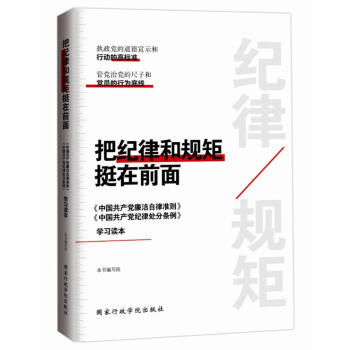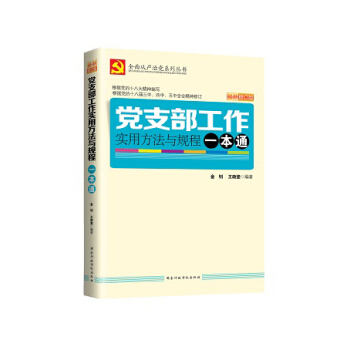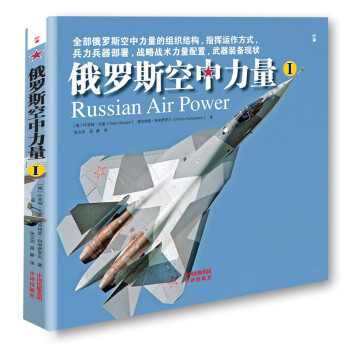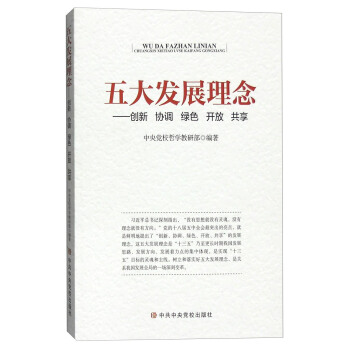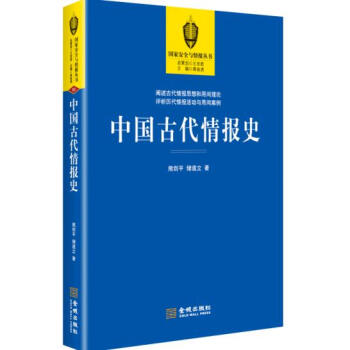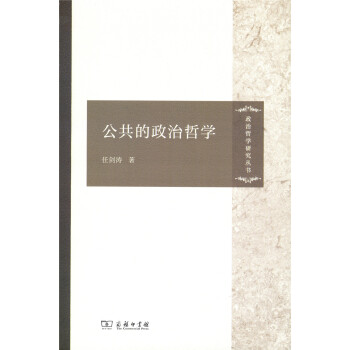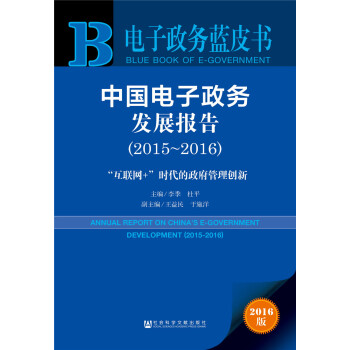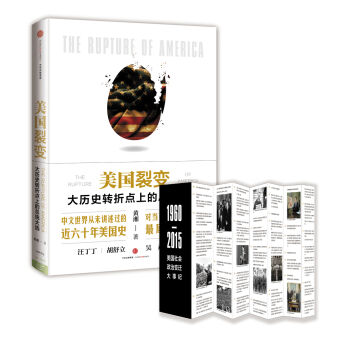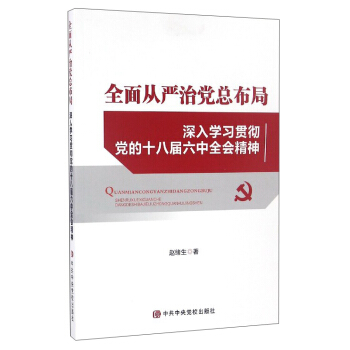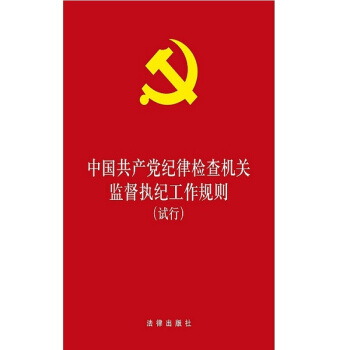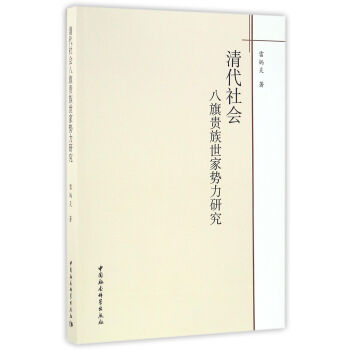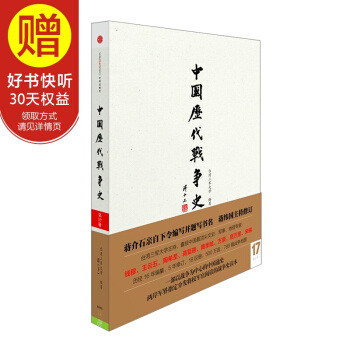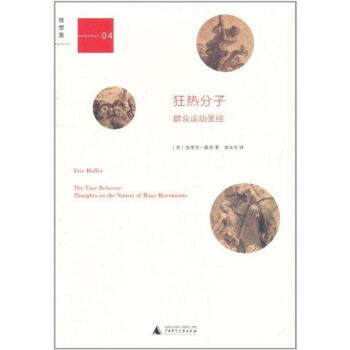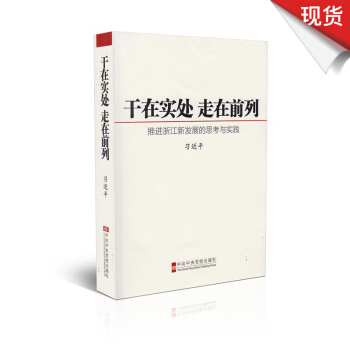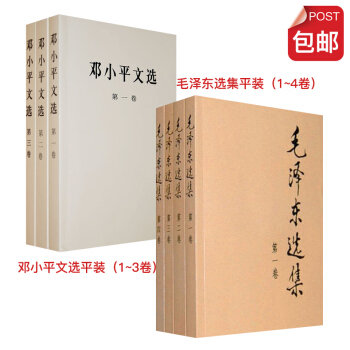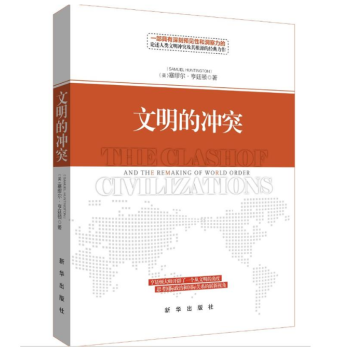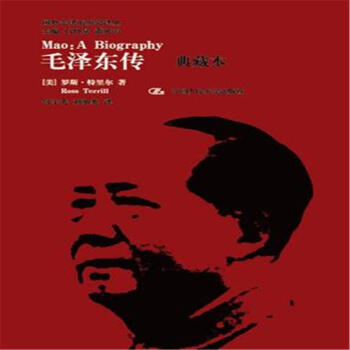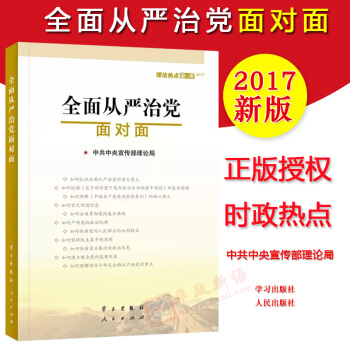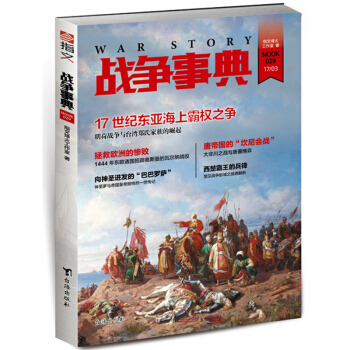具体描述
编辑推荐
全面从严治党永远在路上。在党的十八届五中全会召开前夕,中共中央印发《中国共产党廉洁自律准则》和《中国共产党纪律处分条例》。新修订的《中国共产党廉洁自律准则》(以下简称《准则》)和《中国共产党纪律处分条例》(以下简称《条例》),是落实党的十八大和十八届三中、四中全会精神,贯彻习总书记系列重要讲话精神,加强党内法规制度建设的重要成果。为使广大党员干部深刻领会《准则》和《条例》修订的重大意义,深刻理解“四个必须”“八条规范”“六大纪律”的丰富内涵和精神实质,我们特组织编写本书。
内容:全面分析《中国共产党廉洁自律准则》《中国共产党纪律处分条例》修订情况、主要内容、创新特点,全方位解读两项新规;
作者:中共中央党校党的建设教研部、中央党校思想政治教育教研室、国家行政学院政治学教研部等有关领域专家学者;
阅读:文章分类清晰,便于快速查找。
内容简介
党的十八大以来,党中央高度重视党的纪律建设,突出强调严明政治纪律和政治规矩。中共中央印发了《中国共产党廉洁自律准则》和《中国共产党纪律处分条例》,两个法规一个注重自我提升,一个注重惩戒约束,使党员干部在廉洁自律中干事担当,在遵章守纪中实现自我净化与提升。本书从党的理想信念宗旨、优良传统作风以及党的若干纪律建设出发,为党员干部明确了要遵循的“高线”和不可触碰的底线,是党员干部学习掌握作风建设和反腐倡廉建设相关知识的重要参考资料。
目录
习近平总书记重要论述摘编
坚持高标准·守住底线·推进全面从严治党制度创新
中共中央印发《中国共产党廉洁自律准则》
中国共产党廉洁自律准则
中共中央印发《中国共产党纪律处分条例》
中国共产党纪律处分条例
上篇·执政党的道德宣示和行动的高标准
一、坚持高标准,始终做到“四个必须”
始终高举理想信念的精神旗帜
始终代表人民群众的意志和利益
党的优良传统永远不会过时
把群众路线深深植根于党员干部的思想和行动
运用好批评和自我批评这一有力武器
领导干部要有更高的道德境界
二、正确处理“四大关系”,做合格的共产党员
为官者公私论的四重境界
必须强化公职人员公私分明意识
坚持干净与干事相统一
从“君子所其无逸”谈勤俭兴政
大力弘扬勤俭节约优良传统
筑牢克服享乐主义的思想基础
三、坚定“四个自觉”,做党和人民的好干部
让廉洁从政成为领导干部自觉坚守
严守纪律忠诚干事 严以用权干净干事
把严以修身摆在为官从政的首要位置
干部修身也讲“四美具”
家正国清:优良家风家规的伦理价值及其实现路径
党员干部要以好家风涵养好作风
下篇·管党治党的尺子和党员的行为底线
一、纪律是党的生命
靠着纪律和规矩·我们一路走来
党的纪律优势的形成发展及启示
严明党的纪律在管党治党中的重要作用
科学准确把握党纪与国法的关系
严明纪律是实现中国梦的重要保证
加强党的纪律建设·落实全面从严治党要求
二、严明政治纪律,自觉维护中央权威
严守党的政治纪律和政治规矩
切实把严守政治纪律政治规矩摆在更加重要位置
严守政治纪律·强化责任担当
领导干部要严守政治纪律和政治规矩
要把严守党的政治纪律和政治规矩排在首位
三、严明组织纪律,增强党的凝聚力战斗力
切实执行组织纪律·维护党的集中统一
消除组织涣散须严明党的纪律
严肃执行并带头遵守党的组织纪律
让组织纪律成为“全天候带电的高压线”
严明党的组织纪律保障改革健康顺利推进
四、严明其他纪律,做守纪律讲规矩的表率
严守廉洁纪律·永葆清廉本色
严守群众纪律·保持党同人民群众血肉联系
严明党的工作纪律·依规开展各项工作
严守生活纪律·培养高尚情操
破除官场“圈子文化”
做党的群众纪律的守护者
在纪律上还要进一步严起来
精彩书摘
《把纪律和规矩挺在前面:中国共产党廉洁自律准则 中国共产党纪律处分条例 学习读本》:
绩效考核不计政绩成本。为加快发展,各地领导干部纷纷搞大规划、大发展,实现大跨越。有些项目超出了本地的财力,透支了民力,造成了大浪费。而我们对领导干部的绩效进行考核时,往往只看GDP,这种考核方式忽视了施政成本。这样的绩效被夸得越大,对党和国家的危害就越大。有的领导干部为取得好的绩效不惜以牺牲环境、资源等为代价,进行掠夺性开发,为了一时的政绩付出了不应有的财力代价和资源代价,其结果往往是一时风光之后一蹶不振。因此,对领导干部的绩效进行考核,不能简单地看结果,还要看取得绩效所付出的成本。不但要看绩前基础,更要看绩后基础,看绩效的可持续发展。
舆论的误导。近些年来,我们越来越多地了解到许多原来非常陌生的国外生产的奢侈品牌,国内外的许多媒体也在不断宣传中国游客在国外大量购买奢侈商品,许多国外奢侈品不断抢滩中国市场。于是许多国人以消费奢侈品为荣,互相攀比炫耀,并把此种消费行为贴上成功人士的符号象征。
刹住奢侈之风
毛泽东同志曾经说过,“贪污和浪费是极大的犯罪”。奢侈浪费之风一日不除,党和政府的良好形象就会严重受损,不遏制奢侈浪费现象的滋生与蔓延,就是对党的事业的不负责任,就是一种犯罪。因此,我们应该重拳出击,多管齐下,坚决刹住奢侈浪费之风。
第一,继续大力提倡艰苦奋斗,勤俭节约。艰苦奋斗是党的优良传统,是党团结和带领人民实现国家富强、民族振兴的强大精神力量,对抵御各种腐朽思想侵袭、保持党和国家政权永不变质具有重要意义。我们党是靠艰苦奋斗起家的,干革命需要艰苦奋斗,搞建设同样需要艰苦奋斗。在社会主义初级阶段,我们全面建成小康社会任务还很艰巨,我们没有理由不艰苦奋斗。办一切事情都要量力而行,精打细算,讲求实效。
……
《严以律己,公正为民:新时代中国共产党党内法规解读与实践》 导言: 在中华民族伟大复兴的壮丽征程中,中国共产党始终将党的建设摆在突出位置。其中,加强党的纪律和规矩建设,是确保党始终成为中国特色社会主义事业坚强领导核心的必然要求。党的十八大以来,以习近平同志为核心的党中央,以前所未有的力度推进全面从严治党,出台了一系列党内法规,为全党划定了清晰的行为底线和道德高线。《中国共产党廉洁自律准则》(以下简称《准则》)和《中国共产党纪律处分条例》(以下简称《条例》)作为新时期党内法规体系的“总开关”和“总遵循”,深刻体现了我们党对自身建设的高度重视和坚定决心。 本书,《严以律己,公正为民:新时代中国共产党党内法规解读与实践》,并非简单罗列条文,而是旨在深入解读《准则》和《条例》的核心要义,阐释其蕴含的深刻思想,剖析其制定和修订的时代背景与重大意义,并结合鲜活的实践案例,引导广大党员干部深刻理解、自觉遵守,将党内法规的要求转化为日常的言行规范和工作自觉,以更加坚定的政治立场、更加过硬的党性修养、更加务实的工作作风,投身于党和人民事业的伟大实践。 第一章:立规矩,明底线——《中国共产党廉洁自律准则》的精神要义与时代价值 《准则》是我们党历史上第一部将廉洁自律作为总要求的党内规范性文件,它以鲜明的政治导向、鲜活的时代特征、鲜明的道德要求,为全体党员树立了看得见的道德标杆和看得见的行为规范。《准则》从“四个必须”和“八个坚持”两个层面,对全体党员提出了基本要求,其核心要义在于: 1. 坚持高尚的道德情操,抵制低俗的腐朽思想。 “廉洁自律,才能保持党的先进性和纯洁性。”《准则》要求党员干部必须坚持公私分明、先公后私、为公奉献,以崇高的道德追求约束自身行为。这与当前社会思潮的复杂性、价值观念的多元化形成了鲜明对比,旗帜鲜明地指出了共产党人应有的价值取向,是对党员干部思想道德建设的“加法”,是提升党性修养的“助推器”。 2. 严守政治纪律,维护党的团结统一。 “坚持理想信念,是党员干部的精神之‘钙’。”《准则》将理想信念、党性修养、宗旨意识、道德品格等内容融入其中,强调党员干部要坚定共产主义理想,牢固树立全心全意为人民服务的宗旨,不断锤炼高尚的道德品格。这不仅是政治要求,更是对党员干部世界观、人生观、价值观的根本塑造。 3. 践行使命担当,永葆初心本色。 《准则》的修订和完善,是对党的性质、宗旨、历史使命的深刻回应。在新的历史条件下,面对错综复杂的国内外形势和艰巨繁重的改革发展稳定任务,如何保持党的先进性和纯洁性,始终赢得人民群众的信赖和拥护,是党面临的重大课题。《准则》以其高度的政治站位,回应了这一时代命题,为党员干部提供了坚实的思想和道德指引。 4. “四个必须”与“八个坚持”的逻辑关系。 《准则》开篇的“四个必须”,即“必须坚定共产主义远大理想和中国特色社会主义共同理想,∴∴∴∵∵∴∴∴∴∴∴∴∴∴∴∴∴∴∴∴∴∴∴∴∴∴∴∴∴∴∴∴∴∴∴∴∴∴∴∴∴∴∴∴∴∴∴∴∴∴∴∴∴∴∴∴∴∴∴∴∴∴∴∴∴∴∴∴∴∴∴∴∴∴∴∴∴∴∴∴∴∴∴∴∴∴∴∴∴∴∴∴∴∴∴∴∴∴∴∴∴∴∴∴∴∴∴∴∴∴∴∴∴∴∴∴∴∴∴∴∴∴∴∴∴∴∴∴∴∴∴∴∴∴∴∴∴∴∴∴∴∴∴∴∴∴∴∴∴∴∴∴∴∴∴∴∴∴∴∴∴∴∴∴∴∴∴∴∴∴∴∴∴∴∴∴∴∴∴∴∴∴∴∴∴∴∴∴∴∴∴∴∴∴∴∴∴∴∴∴∴∴∴∴∴∴∴∴∴∴∴∴∴∴∴∴∴∴∴∴∴∴∴∴∴∴∴∴∴∴∴∴∴∴∴∴∴∴∴∴∴∴∴∴∴∴∴∴∴∴∴∴∴∴∴∴∴∴∴∴∴∴∴∴∴∴∴∴∴∴∴∴∴∴∴∴∴∴∴∴∴∴∴∴∴∴∴∴∴∴∴∴∴∴∴∴∴∴∴∴∴∴∴∴∴∴∴∴∴∴∴∴∴∴∴∴∴∴∴∴∴∴∴∴∴∴∴∴∴∴∴∴∴∴∴∴∴∴∴∴∴∴∴∴∴∴∴∴∴∴∴∴∴∴∴∴∴∴∴∴∴∴∴∴∴∴∴∴∴∴∴∴∴∴∴∴∴∴∴∴∴∴∴∴∴∴∴∴∴∴∴∴∴∴∴∴∴∴∴∴∴∴∴∴∴∴∴∴∴∴∴∴∴∴∴∴∴∴∴∴∴∴∴∴∴∴∴∴∴∴∴∴∴∴∴∴∴∴∴∴∴∴∴∴∴∴∴∴∴∴∴∴∴∴∴∴∴∴∴∴∴∴∴∴∴∴∴∴∴∴∴∴∴∴∴∴∴∴∴∴∴∴∴∴∴∴∴∴∴∴∴∴∴∴∴∴∴∴∴∴∴∴∴∴∴∴∴∴∴∴∴∴∴∴∴∴∴∴∴∴∴∴∴∴∴∴∴∴∴∴∴∴∴∴∴∴∴∴∴∴∴∴∴∴∴∴∴∴∴∴∴∴∴∴∴∴∴∴∴∴∴∴∴∴∴∴∴∴∴∴∴∴∴∴∴∴∴∴∴∴∴∴∴∴∴∴∴∴∴∴∴∴∴∴∴∴∴∴∴∴∴∴∴∴∴∴∴∴∴∴∴∴∴∴∴∴∴∴∴∴∴∴∴∴∴∴∴∴∴∴∴∴∴∴∴∴∴∴∴∴∴∴∴∴∴∴∴∴∴∴∴∴∴∴∴∴∴∴∴∴∴∴∴∴∴∴∴∴∴∴∴∴∴∴∴∴∴∴∴∴∴∴∴∴∴∴∴∴∴∴∴∴∴∴∴∴∴∴∴∴∴∴∴∴∴∴∴∴∴∴∴∴∴∴∴∴∴∴∴∴∴∴∴∴∴∴∴∴∴∴∴∴∴∴∴∴∴∴∴∴∴∴∴∴∴∴∴∴∴∴∴∴∴∴∴∴∴∴∴∴∴∴∴∴∴∴∴∴∴∴∴∴∴∴∴∴∴∴∴∴∴∴∴∴∴∴∴∴∴∴∴∴∴∴∴∴∴∴∴∴∴∴∴∴∴∴∴∴∴∴∴∴∴∴∴∴∴∴∴∴∴∴∴∴∴∴∴∴∴∴∴∴∴∴∴∴∴∴∴∴∴∴∴∴∴∴∴∴∴∴∴∴∴∴∴∴∴∴∴∴∴∴∴∴∴∴∴∴∴∴∴∴∴∴∴∴∴∴∴∴∴∴∴∴∴∴∴∴∴∴∴∴∴∴∴∴∴∴∴∴∴∴∴∴∴∴∴∴∴∴∴∴∴∴∴∴∴∴∴∴∴∴∴∴∴∴∴∴∴∴∴∴∴∴∴∴∴∴∴∴∴∴∴∴∴∴∴∴∴∴∴∴∴∴∴∴∴∴∴∴∴∴∴∴∴∴∴∴∴∴∴∴∴∴∴∴∴∴∴∴∴∴∴∴∴∴∴∴∴∴∴∴∴∴∴∴∴∴∴∴∴∴∴∴∴∴∴∴∴∴∴∴∴∴∴∴∴∴∴∴∴∴∴∴∴∴∴∴∴∴∴∴∴∴∴∴∴∴∴∴∴∴∴∴∴∴∴∴∴∴∴∴∴∴∴∴∴∴∴∴∴∴∴∴∴∴∴∴∴∴∴∴∴∴∴∴∴∴∴∴∴∴∴∴∴∴∴∴∴∴∴∴∴∴∴∴∴∴∴∴∴∴∴∴∴∴∴∴∴∴∴∴∴∴∴∴∴∴∴∴∴∴∴∴∴∴∴∴∴∴∴∴∴∴∴∴∴∴∴∴∴∴∴∴∴∴∴∴∴∴∴∴∴∴∴∴∴∴∴∴∴∴∴∴∴∴∴∴∴∴∴∴∴∴∴∴∴∴∴∴∴∴∴∴∴∴∴∴∴∴∴∴∴∴∴∴∴∴∴∴∴∴∴∴∴∴∴∴∴∴∴∴∴∴∴∴∴∴∴∴∴∴∴∴∴∴∴∴∴∴∴∴∴∴∴∴∴∴∴∴∴∴∴∴∴∴∴∴∴∴∴∴∴∴∴∴∴∴∴∴∴∴∴∴∴∴∴∴∴∴∴∴∴∴∴∴∴∴∴∴∴∴∴∴∴∴∴∴∴∴∴∴∴∴∴∴∴∴∴∴∴∴∴∴∴∴∴∴∴∴∴∴∴∴∴∴∴∴∴∴∴∴∴∴∴∴∴∴∴∴∴∴∴∴∴∴∴∴∴∴∴∴∴∴∴∴∴∴∴∴∴∴∴∴∴∴∴∴∴∴∴∴∴∴∴∴∴∴∴∴∴∴∴∴∴∴∴∴∴∴∴∴∴∴∴∴∴∴∴∴∴∴∴∴∴∴∴∴∴∴∴∴∴∴∴∴∴∴∴∴∴∴∴∴∴∴∴∴∴∴∴∴∴∴∴∴∴∴∴∴∴∴∴∴∴∴∴∴∴∴∴∴∴∴∴∴∴∴∴∴∴∴∴∴∴∴∴∴∴∴∴∴∴∴∴∴∴∴∴∴∴∴∴∴∴∴∴∴∴∴∴∴∴∴∴∴∴∴∴∴∴∴∴∴∴∴∴∴∴∴∴∴∴∴∴∴∴∴∴∴∴∴∴∴∴∴∴∴∴∴∴∴∴∴∴∴∴∴∴∴∴∴∴∴∴∴∴∴∴∴∴∴∴∴∴∴∴∴∴∴∴∴∴∴∴∴∴∴∴∴∴∴∴∴∴∴∴∴∴∴∴∴∴∴∴∴∴∴∴∴∴∴∴∴∴∴∴∴∴∴∴∴∴∴∴∴∴∴∴∴∴∴∴∴∴∴∴∴∴∴∴∴∴∴∴∴∴∴∴∴∴∴∴∴∴∴∴∴∴∴∴∴∴∴∴∴∴∴∴∴∴∴∴∴∴∴∴∴∴∴∴∴∴∴∴∴∴∴∴∴∴∴∴∴∴∴∴∴∴∴∴∴∴∴∴∴∴∴∴∴∴∴∴∴∴∴∴∴∴∴∴∴∴∴∴∴∴∴∴∴∴∴∴∴∴∴∴∴∴∴∴∴∴∴∴∴∴∴∴∴∴∴∴∴∴∴∴∴∴∴∴∴∴∴∴∴∴∴∴∴∴∴∴∴∴∴∴∴∴∴∴∴∴∴∴∴∴∴∴∴∴∴∴∴∴∴∴∴∴∴∴∴∴∴∴∴∴∴∴∴∴∴∴∴∴∴∴∴∴∴∴∴∴∴∴∴∴∴∴∴∴∴∴∴∴∴∴∴∴∴∴∴∴∴∴∴∴∴∴∴∴∴∴∴∴∴∴∴∴∴∴∴∴∴∴∴∴∴∴∴∴∴∴∴∴∴∴∴∴∴∴∴∴∴∴∴∴∴∴∴∴∴∴∴∴∴∴∴∴∴∴∴∴∴∴∴∴∴∴∴∴∴∴∴∴∴∴∴∴∴∴∴∴∴∴∴∴∴∴∴∴∴∴∴∴∴∴∴∴∴∴∴∴∴∴∴∴∴∴∴∴∴∴∴∴∴∴∴∴∴∴∴∴∴∴∴∴∴∴∴∴∴∴∴∴∴∴∴∴∴∴∴∴∴∴∴∴∴∴∴∴∴∴∴∴∴∴∴∴∴∴∴∴∴∴∴∴∴∴∴∴∴∴∴∴∴∴∴∴∴∴∴∴∴∴∴∴∴∴∴∴∴∴∴∴∴∴∴∴∴∴∴∴∴∴∴∴∴∴∴∴∴∴∴∴∴∴∴∴∴∴∴∴∴∴∴∴∴∴∴∴∴∴∴∴∴∴∴∴∴∴∴∴∴∴∴∴∴∴∴∴∴∴∴∴∴∴∴∴∴∴∴∴∴∴∴∴∴∴∴∴∴∴∴∴∴∴∴∴∴∴∴∴∴∴∴∴∴∴∴∴∴∴∴∴∴∴∴∴∴∴∴∴∴∴∴∴∴∴∴∴∴∴∴∴∴∴∴∴∴∴∴∴∴∴∴∴∴∴∴∴∴∴∴∴∴∴∴∴∴∴∴∴∴∴∴∴∴∴∴∴∴∴∴∴∴∴∴∴∴∴∴∴∴∴∴∴∴∴∴∴∴∴∴∴∴∴∴∴∴∴∴∴∴∴∴∴∴∴∴∴∴∴∴∴∴∴∴∴∴∴∴∴∴∴∴∴∴∴∴∴∴∴∴∴∴∴∴∴∴∴∴∴∴∴∴∴∴∴∴∴∴∴∴∴∴∴∴∴∴∴∴∴∴∴∴∴∴∴∴∴∴∴∴∴∴∴∴∴∴∴∴∴∴∴∴∴∴∴∴∴∴∴∴∴∴∴∴∴∴∴∴∴∴∴∴∴∴∴∴∴∴∴∴∴∴∴∴∴∴∴∴∴∴∴∴∴∴∴∴∴∴∴∴∴∴∴∴∴∴∴∴∴∴∴∴∴∴∴∴∴∴∴∴∴∴∴∴∴∴∴∴∴∴∴∴∴∴∴∴∴∴∴∴∴∴∴∴∴∴∴∴∴∴∴∴∴∴∴∴∴∴∴∴∴∴∴∴∴∴∴∴∴∴∴∴∴∴∴∴∴∴∴∴∴∴∴∴∴∴∴∴∴∴∴∴∴∴∴∴∴∴∴∴∴∴∴∴∴∴∴∴∴∴∴∴∴∴∴∴∴∴∴∴∴∴∴∴∴∴∴∴∴∴∴∴∴∴∴∴∴∴∴∴∴∴∴∴∴∴∴∴∴∴∴∴∴∴∴∴∴∴∴∴∴∴∴∴∴∴∴∴∴∴∴∴∴∴∴∴∴∴∴∴∴∴∴∴∴∴∴∴∴∴∴∴∴∴∴∴∴∴∴∴∴∴∴∴∴∴∴∴∴∴∴∴∴∴∴∴∴∴∴∴∴∴∴∴∴∴∴∴∴∴∴∴∴∴∴∴∴∴∴∴∴∴∴∴∴∴∴∴∴∴∴∴∴∴∴∴∴∴∴∴∴∴∴∴∴∴∴∴∴∴∴∴∴∴∴∴∴∴∴∴∴∴∴∴∴∴∴∴∴∴∴∴∴∴∴∴∴∴∴∴∴∴∴∴∴∴∴∴∴∴∴∴∴∴∴∴∴∴∴∴∴∴∴∴∴∴∴∴∴∴∴∴∴∴∴∴∴∴∴∴∴∴∴∴∴∴∴∴∴∴∴∴∴∴∴∴∴∴∴∴∴∴∴∴∴∴∴∴∴∴∴∴∴∴∴∴∴∴∴∴∴∴∴∴∴∴∴∴∴∴∴∴∴∴∴∴∴∴∴∴∴∴∴∴∴∴∴∴∴∴∴∴∴∴∴∴∴∴∴∴∴∴∴∴∴∴∴∴∴∴∴∴∴∴∴∴∴∴∴∴∴∴∴∴∴∴∴∴∴∴∴∴∴∴∴∴∴∴∴∴∴∴∴∴∴∴∴∴∴∴∴∴∴∴∴∴∴∴∴∴∴∴∴∴∴∴∴∴∴∴∴∴∴∴∴∴∴∴∴∴∴∴∴∴∴∴∴∴∴∴∴∴∴∴∴∴∴∴∴∴∴∴∴∴∴∴∴∴∴∴∴∴∴∴∴∴∴∴∴∴∴∴∴∴∴∴∴∴∴∴∴∴∴∴∴∴∴∴∴∴∴∴∴∴∴∴∴∴∴∴∴∴∴∴∴∴∴∴∴∴∴∴∴∴∴∴∴∴∴∴∴∴∴∴∴∴∴∴∴∴∴∴∴∴∴∴∴∴∴∴∴∴∴∴∴∴∴∴∴∴∴∴∴∴∴∴∴∴∴∴∴∴∴∴∴∴∴∴∴∴∴∴∴∴∴∴∴∴∴∴∴∴∴∴∴∴∴∴∴∴∴∴∴∴∴∴∴∴∴∴∴∴∴∴∴∴∴∴∴∴∴∴∴∴∴∴∴∴∴∴∴∴∴∴∴∴∴∴∴∴∴∴∴∴∴∴∴∴∴∴∴∴∴∴∴∴∴∴∴∴∴∴∴∴∴∴∴∴∴∴∴∴∴∴∴∴∴∴∴∴∴∴∴∴∴∴∴∴∴∴∴∴∴∴∴∴∴∴∴∴∴∴∴∴∴∴∴∴∴∴∴∴∴∴∴∴∴∴∴∴∴∴∴∴∴∴∴∴∴∴∴∴∴∴∴∴∴∴∴∴∴∴∴∴∴∴∴∴∴∴∴∴∴∴∴∴∴∴∴∴∴∴∴∴∴∴∴∴∴∴∴∴∴∴∴∴∴∴∴∴∴∴∴∴∴∴∴∴∴∴∴∴∴∴∴∴∴∴∴∴∴∴∴∴∴∴∴∴∴∴∴∴∴∴∴∴∴∴∴∴∴∴∴∴∴∴∴∴∴∴∴∴∴∴∴∴∴∴∴∴∴∴∴∴∴∴∴∴∴∴∴∴∴∴∴∴∴∴∴∴∴∴∴∴∴∴∴∴∴∴∴∴∴∴∴∴∴∴∴∴∴∴∴∴∴∴∴∴∴∴∴∴∴∴∴∴∴∴∴∴∴∴∴∴∴∴∴∴∴∴∴∴∴∴∴∴∴∴∴∴∴∴∴∴∴∴∴∴∴∴∴∴∴∴∴∴∴∴∴∴∴∴∴∴∴∴∴∴∴∴∴∴∴∴∴∴∴∴∴∴∴∴∴∴∴∴∴∴∴∴∴∴∴∴∴∴∴∴∴∴∴∴∴∴∴∴∴∴∴∴∴∴∴∴∴∴∴∴∴∴∴∴∴∴∴∴∴∴∴∴∴∴∴∴∴∴∴∴∴∴∴∴∴∴∴∴∴∴∴∴∴∴∴∴∴∴∴∴∴∴∴∴∴∴∴∴∴∴∴∴∴∴∴∴∴∴∴∴∴∴∴∴∴∴∴∴∴∴∴∴∴∴∴∴∴∴∴∴∴∴∴∴∴∴∴∴∴∴∴∴∴∴∴∴∴∴∴∴∴∴∴∴∴∴∴∴∴∴∴∴∴∴∴∴∴∴∴∴∴∴∴∴∴∴∴∴∴∴∴∴∴∴∴∴∴∴∴∴∴∴∴∴∴∴∴∴∴∴∴∴∴∴∴∴∴∴∴∴∴∴∴∴∴∴∴∴∴∴∴∴∴∴∴∴∴∴∴∴∴∴∴∴∴∴∴∴∴∴∴∴∴∴∴∴∴∴∴∴∴∴∴∴∴∴∴∴∴∴∴∴∴∴∴∴∴∴∴∴∴∴∴∴∴∴∴∴∴∴∴∴∴∴∴∴∴∴∴∴∴∴∴∴∴∴∴∴∴∴∴∴∴∴∴∴∴∴∴∴∴∴∴∴∴∴∴∴∴∴∴∴∴∴∴∴∴∴∴∴∴∴∴∴∴∴∴∴∴∴∴∴∴∴∴∴∴∴∴∴∴∴∴∴∴∴∴∴∴∴∴∴∴∴∴∴∴∴∴∴∴∴∴∴∴∴∴∴∴∴∴∴∴∴∴∴∴∴∴∴∴∴∴∴∴∴∴∴∴∴∴∴∴∴∴∴∴∴∴∴∴∴∴∴∴∴∴∴∴∴∴∴∴∴∴∴∴∴∴∴∴∴∴∴∴∴∴∴∴∴∴∴∴∴∴∴∴∴∴∴∴∴∴∴∴∴∴∴∴∴∴∴∴∴∴∴∴∴∴∴∴∴∴∴∴∴∴∴∴∴∴∴∴∴∴∴∴∴∴∴∴∴∴∴∴∴∴∴∴∴∴∴∴∴∴∴∴∴∴∴∴∴∴∴∴∴∴∴∴∴∴∴∴∴∴∴∴∴∴∴∴∴∴∴∴∴∴∴∴∴∴∴∴∴∴∴∴∴∴∴∴∴∴∴∴∴∴∴∴∴∴∴∴∴∴∴∴∴∴∴∴∴∴∴∴∴∴∴∴∴∴∴∴∴∴∴∴∴∴∴∴∴∴∴∴∴∴∴∴∴∴∴∴∴∴∴∴∴∴∴∴∴∴∴∴∴∴∴∴∴∴∴∴∴∴∴∴∴∴∴∴∴∴∴∴∴∴∴∴∴∴∴∴∴∴∴∴∴∴∴∴∴∴∴∴∴∴∴∴∴∴∴∴∴∴∴∴∴∴∴∴∴∴∴∴∴∴∴∴∴∴∴∴∴∴∴∴∴∴∴∴∴∴∴∴∴∴∴∴∴∴∴∴∴∴∴∴∴∴∴∴∴∴∴∴∴∴∴∴∴∴∴∴∴∴∴∴∴∴∴∴∴∴∴∴∴∴∴∴∴∴∴∴∴∴∴∴∴∴∴∴∴∴∴∴∴∴∴∴∴∴∴∴∴∴∴∴∴∴∴∴∴∴∴∴∴∴∴∴∴∴∴∴∴∴∴∴∴∴∴∴∴∴∴∴∴∴∴∴∴∴∴∴∴∴∴∴∴∴∴∴∴∴∴∴∴∴∴∴∴∴∴∴∴∴∴∴∴∴∴∴∴∴∴∴∴∴∴∴∴∴∴∴∴∴∴∴∴∴∴∴∴∴∴∴∴∴∴∴∴∴∴∴∴∴∴∴∴∴∴∴∴∴∴∴∴∴∴∴∴∴∴∴∴∴∴∴∴∴∴∴∴∴∴∴∴∴∴∴∴∴∴∴∴∴∴∴∴∴∴∴∴∴∴∴∴∴∴∴∴∴∴∴∴∴∴∴∴∴∴∴∴∴∴∴∴∴∴∴∴∴∴∴∴∴∴∴∴∴∴∴∴∴∴∴∴∴∴∴∴∴∴∴∴∴∴∴∴∴∴∴∴∴∴∴∴∴∴∴∴∴∴∴∴∴∴∴∴∴∴∴∴∴∴∴∴∴∴∴∴∴∴∴∴∴∴∴∴∴∴∴∴∴∴∴∴∴∴∴∴∴∴∴∴∴∴∴∴∴∴∴∴∴∴∴∴∴∴∴∴∴∴∴∴∴∴∴∴∴∴∴∴∴∴∴∴∴∴∴∴∴∴∴∴∴∴∴∴∴∴∴∴∴∴∴∴∴∴∴∴∴∴∴∴∴∴∴∴∴∴∴∴∴∴∴∴∴∴∴∴∴∴∴∴∴∴∴∴∴∴∴∴∴∴∴∴∴∴∴∴∴∴∴∴∴∴∴∴∴∴∴∴∴∴∴∴∴∴∴∴∴∴∴∴∴∴∴∴∴∴∴∴∴∴∴∴∴∴∴∴∴∴∴∴∴∴∴∴∴∴∴∴∴∴∴∴∴∴∴∴∴∴∴∴∴∴∴∴∴∴∴∴∴∴∴∴∴∴∴∴∴∴∴∴∴∴∴∴∴∴∴∴∴∴∴∴∴∴∴∴∴∴∴∴∴∴∴∴∴∴∴∴∴∴∴∴∴∴∴∴∴∴∴∴∴∴∴∴∴∴∴∴∴∴∴∴∴∴∴∴∴∴∴∴∴∴∴∴∴∴∴∴∴∴∴∴∴∴∴∴∴∴∴∴∴∴∴∴∴∴∴∴∴∴∴∴∴∴∴∴∴∴∴∴∴∴∴∴∴∴∴∴∴∴∴∴∴∴∴∴∴∴∴∴∴∴∴∴∴∴∴∴∴∴∴∴∴∴∴∴∴∴∴∴∴∴∴∴∴∴∴∴∴∴∴∴∴∴∴∴∴∴∴∴∴∴∴∴∴∴∴∴∴∴∴∴∴∴∴∴∴∴∴∴∴∴∴∴∴∴∴∴∴∴∴∴∴∴∴∴∴∴∴∴∴∴∴∴∴∴∴∴∴∴∴∴∴∴∴∴∴∴∴∴∴∴∴∴∴∴∴∴∴∴∴∴∴∴∴∴∴∴∴∴∴∴∴∴∴∴∴∴∴∴∴∴∴∴∴∴∴∴∴∴∴∴∴∴∴∴∴∴∴∴∴∴∴∴∴∴∴∴∴∴∴∴∴∴∴∴∴∴∴∴∴∴∴∴∴∴∴∴∴∴∴∴∴∴∴∴∴∴∴∴∴∴∴∴∴∴∴∴∴∴∴∴∴∴∴∴∴∴∴∴∴∴∴∴∴∴∴∴∴∴∴∴∴∴∴∴∴∴∴∴∴∴∴∴∴∴∴∴∴∴∴∴∴∴∴∴∴∴∴∴∴∴∴∴∴∴∴∴∴∴∴∴∴∴∴∴∴∴∴∴∴∴∴∴∴∴∴∴∴∴∴∴∴∴∴∴∴∴∴∴∴∴∴∴∴∴∴∴∴∴∴∴∴∴∴∴∴∴∴∴∴∴∴∴∴∴∴∴∴∴∴∴∴∴∴∴∴∴∴∴∴∴∴∴∴∴∴∴∴∴∴∴∴∴∴∴∴∴∴∴∴∴∴∴∴∴∴∴∴∴∴∴∴∴∴∴∴∴∴∴∴∴∴∴∴∴∴∴∴∴∴∴∴∴∴∴∴∴∴∴∴∴∴∴∴∴∴∴∴∴∴∴∴∴∴∴∴∴∴∴∴∴∴∴∴∴∴∴∴∴∴∴∴∴∴∴∴∴∴∴∴∴∴∴∴∴∴∴∴∴∴∴∴∴∴∴∴∴∴∴∴∴∴∴∴∴∴∴∴∴∴∴∴∴∴∴∴∴∴∴∴∴∴∴∴∴∴∴∴∴∴∴∴∴∴∴∴∴∴∴∴∴∴∴∴∴∴∴∴∴∴∴∴∴∴∴∴∴∴∴∴∴∴∴∴∴∴∴∴∴∴∴∴∴∴∴∴∴∴∴∴∴∴∴∴∴∴∴∴∴∴∴∴∴∴∴∴∴∴∴∴∴∴∴∴∴∴∴∴∴∴∴∴∴∴∴∴∴∴∴∴∴∴∴∴∴∴∴∴∴∴∴∴∴∴∴∴∴∴∴∴∴∴∴∴∴∴∴∴∴∴∴∴∴∴∴∴∴∴∴∴∴∴∴∴∴∴∴∴∴∴∴∴∴∴∴∴∴∴∴∴∴∴∴∴∴∴∴∴∴∴∴∴∴∴∴∴∴∴∴∴∴∴∴∴∴∴∴∴∴∴∴∴∴∴∴∴∴∴∴∴∴∴∴∴∴∴∴∴∴∴∴∴∴∴∴∴∴∴∴∴∴∴∴∴∴∴∴∴∴∴∴∴∴∴∴∴∴∴∴∴∴∴∴∴∴∴∴∴∴∴∴∴∴∴∴∴∴∴∴∴∴∴∴∴∴∴∴∴∴∴∴∴∴∴∴∴∴∴∴∴∴∴∴∴∴∴∴∴∴∴∴∴∴∴∴∴∴∴∴∴∴∴∴∴∴∴∴∴∴∴∴∴∴∴∴∴∴∴∴∴∴∴∴∴∴∴∴∴∴∴∴∴∴∴∴∴∴∴∴∴∴∴∴∴∴∴∴∴∴∴∴∴∴∴∴∴∴∴∴∴∴∴∴∴∴∴∴∴∴∴∴∴∴∴∴∴∴∴∴∴∴∴∴∴∴∴∴∴∴∴∴∴∴∴∴∴∴∴∴∴∴∴∴∴∴∴∴∴∴∴∴∴∴∴∴∴∴∴∴∴∴∴∴∴∴∴∴∴∴∴∴∴∴∴∴∴∴∴∴∴∴∴∴∴∴∴∴∴∴∴∴∴∴∴∴∴∴∴∴∴∴∴∴∴∴∴∴∴∴∴∴∴∴∴∴∴∴∴∴∴∴∴∴∴∴∴∴∴∴∴∴∴∴∴∴∴∴∴∴∴∴∴∴∴∴∴∴∴∴∴∴∴∴∴∴∴∴∴∴∴∴∴∴∴∴∴∴∴∴∴∴∴∴∴∴∴∴∴∴∴∴∴∴∴∴∴∴∴∴∴∴∴∴∴∴∴∴∴∴∴∴∴∴∴∴∴∴∴∴∴∴∴∴∴∴∴∴∴∴∴∴∴∴∴∴∴∴∴∴∴∴∴∴∴∴∴∴∴∴∴∴∴∴∴∴∴∴∴∴∴∴∴∴∴∴∴∴∴∴∴∴∴∴∴∴∴∴∴∴∴∴∴∴∴∴∴∴∴∴∴∴∴∴∴∴∴∴∴∴∴∴∴∴∴∴∴∴∴∴∴∴∴∴∴∴∴∴∴∴∴∴∴∴∴∴∴∴∴∴∴∴∴∴∴∴∴∴∴∴∴∴∴∴∴∴∴∴∴∴∴∴∴∴∴∴∴∴∴∴∴∴∴∴∴∴∴∴∴∴∴∴∴∴∴∴∴∴∴∴∴∴∴∴∴∴∴∴∴∴∴∴∴∴∴∴∴∴∴∴∴∴∴∴∴∴∴∴∴∴∴∴∴∴∴∴∴∴∴∴∴∴∴∴∴∴∴∴∴∴∴∴∴∴∴∴∴∴∴∴∴∴∴∴∴∴∴∴∴∴∴∴∴∴∴∴∴∴∴∴∴∴∴∴∴∴∴∴∴∴∴∴∴∴∴∴∴∴∴∴∴∴∴∴∴∴∴∴∴∴∴∴∴∴∴∴∴∴∴∴∴∴∴∴∴∴∴∴∴∴∴∴∴∴∴∴∴∴∴∴∴∴∴∴∴∴∴∴∴∴∴∴∴∴∴∴∴∴∴∴∴∴∴∴∴∴∴∴∴∴∴∴∴∴∴∴∴∴∴∴∴∴∴∴∴∴∴∴∴∴∴∴∴∴∴∴∴∴∴∴∴∴∴∴∴∴∴∴∴∴∴∴∴∴∴∴∴∴∴∴∴∴∴∴∴∴∴∴∴∴∴∴∴∴∴∴∴∴∴∴∴∴∴∴∴∴∴∴∴∴∴∴∴∴∴∴∴∴∴∴∴∴∴∴∴∴∴∴∴∴∴∴∴∴∴∴∴∴∴∴∴∴∴∴∴∴∴∴∴∴∴∴∴∴∴∴∴∴∴∴∴∴∴∴∴∴∴∴∴∴∴∴∴∴∴∴∴∴∴∴∴∴∴∴∴∴∴∴∴∴∴∴∴∴∴∴∴∴∴∴∴∴∴∴∴∴∴∴∴∴∴∴∴∴∴∴∴∴∴∴∴∴∴∴∴∴∴∴∴∴∴∴∴∴∴∴∴∴∴∴∴∴∴∴∴∴∴∴∴∴∴∴∴∴∴∴∴∴∴∴∴∴∴∴∴∴∴∴∴∴∴∴∴∴∴∴∴∴∴∴∴∴∴∴∴∴∴∴∴∴∴∴∴∴∴∴∴∴∴∴∴∴∴∴∴∴∴∴∴∴∴∴∴∴∴∴∴∴∴∴∴∴∴∴∴∴∴∴∴∴∴∴∴∴∴∴∴∴∴∴∴∴∴∴∴∴∴∴∴∴∴∴∴∴∴∴∴∴∴∴∴∴∴∴∴∴∴∴∴∴∴∴∴∴∴∴∴∴∴∴∴∴∴∴∴The book you mentioned is a valuable resource for understanding the foundational documents that govern the conduct of Chinese Communist Party members. Here'The book you mentioned provides a detailed examination of two crucial documents for members of the Communist Party of China: the "Code of Conduct for Chinese Communist Party Members on Honesty and Self-Discipline" and the "Regulations on Disciplinary Actions of the Communist Party of China." This book serves as a comprehensive guide for understanding the ethical standards and disciplinary measures set forth by the Party. Part 1: Upholding Discipline and Rules: A Deep Dive into the "Code of Conduct for Chinese Communist Party Members on Honesty and Self-Discipline" This section delves into the fundamental principles and ethical guidelines that all members of the Communist Party of China are expected to adhere to. It emphasizes the importance of maintaining a high moral standard and integrity in both personal and professional life. The book will explore: The Core Principles of Honesty and Self-Discipline: This will involve a detailed analysis of the "Code of Conduct," breaking down its key tenets. It will explain the significance of ideals and beliefs, the importance of serving the people wholeheartedly, and the necessity of upholding ethical conduct in all aspects of life. The Historical Context and Evolution of Self-Discipline: The book will trace the development of ethical standards within the Party, highlighting how these principles have been adapted and strengthened over time to meet contemporary challenges. It will emphasize the Party's commitment to continuous self-improvement. Practical Applications and Scenarios: This part will go beyond theoretical explanations to provide practical examples and case studies illustrating how the principles of honesty and self-discipline are applied in real-world situations. It will aim to equip members with the tools to navigate complex ethical dilemmas. The Role of Self-Discipline in Maintaining Party Purity: The text will articulate how individual adherence to these guidelines contributes to the overall integrity, legitimacy, and effectiveness of the Communist Party of China. It will underscore the connection between personal conduct and the Party's standing with the public. Part 2: Ensuring Accountability: Understanding the "Regulations on Disciplinary Actions of the Communist Party of China" This section focuses on the disciplinary framework established by the Party to maintain order, enforce rules, and ensure accountability among its members. It will provide a thorough explanation of the "Regulations on Disciplinary Actions," outlining the scope, procedures, and consequences of disciplinary measures. Key areas covered will include: The Objectives and Significance of Disciplinary Regulations: The book will explain why disciplinary rules are essential for a political party like the CPC. It will highlight their role in safeguarding the Party's principles, policies, and image, as well as ensuring the smooth functioning of the organization. Categories and Severity of Disciplinary Violations: This part will systematically categorize the types of offenses that can lead to disciplinary action, ranging from minor breaches to serious violations of Party discipline. It will discuss the factors that determine the severity of a penalty. The Disciplinary Process and Procedures: The book will offer a clear and detailed account of the steps involved in handling disciplinary cases, from investigation and review to decision-making and appeal processes. It will emphasize fairness, impartiality, and adherence to legal procedures. Consequences of Disciplinary Actions: This section will outline the various forms of disciplinary measures, including warnings, probation, removal from office, and expulsion from the Party. It will also explain the impact of these measures on a member's rights and status within the Party. Preventive Measures and Education: Beyond punitive actions, the book will also explore the Party's commitment to preventive measures, including education and training, to help members understand and avoid disciplinary violations. It will highlight the importance of proactive ethical cultivation. Part 3: Integrating Regulations into Practice: Towards a New Era of Party Building This concluding section will bridge the gap between understanding the regulations and their practical implementation. It will emphasize how individual members and the Party as a whole can leverage these documents to foster a more robust and effective Party. The Importance of Conscious Application: The book will stress that merely knowing the regulations is insufficient; members must actively internalize them and apply them in their daily work and lives. It will offer strategies for self-reflection and self-correction. Strengthening Supervision and Oversight: This part will discuss the mechanisms for internal Party supervision and the role of external oversight in ensuring compliance with the regulations. It will highlight the importance of transparency and accountability in the disciplinary process. The Link Between Party Discipline and National Governance: The book will articulate how a disciplined and ethical Party is fundamental to effective national governance and the realization of China's development goals. It will connect Party building to the broader mission of national rejuvenation. Call to Action: The text will conclude with a call for all Party members to earnestly study, understand, and abide by these crucial regulations, thereby contributing to the continued strength, vitality, and trustworthiness of the Communist Party of China in the new era. Through this comprehensive exploration, "Upholding Discipline and Rules: A Deep Dive into the 'Code of Conduct for Chinese Communist Party Members on Honesty and Self-Discipline' and the 'Regulations on Disciplinary Actions of the Communist Party of China'" aims to provide readers with a clear, insightful, and practical understanding of these vital Party documents, empowering them to be more conscientious and effective participants in the ongoing process of Party building.
